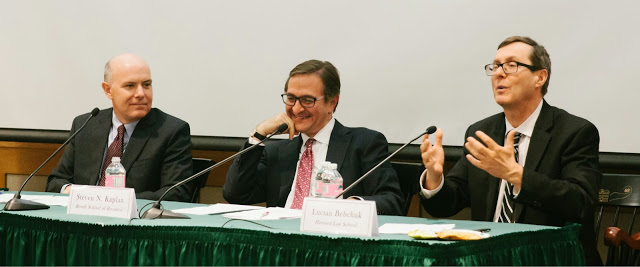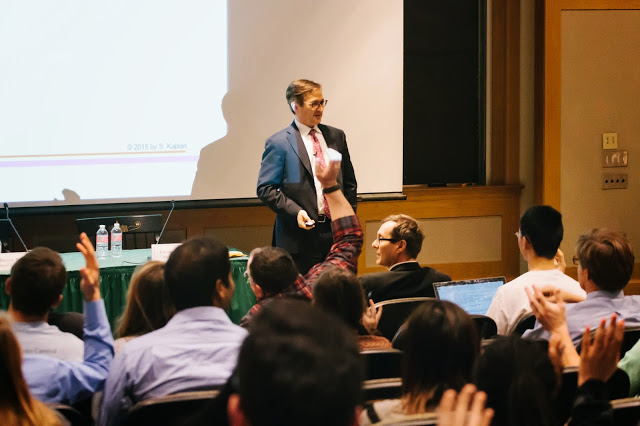- Public Policy
- Leadership
- Funding
- News & Events
- About the Center
Back to Top Nav
Back to Top Nav
Back to Top Nav
Back to Top Nav
Before the Portman Lecture in the Spirit of Entrepreneurship, "Are CEOs Overpaid?" on April 14, Courtney Wong '15 sat down with Professor Steven N. Kaplan for an interview.
The Neubauer Family Distinguished Service Professor of Entrepreneurship and Finance at the University of Chicago Booth School of Business, Steven N. Kaplan is one of the world’s top researchers on private equity, venture capital, corporate governance, executive talent, and income inequality. Professor Kaplan is also the faculty director of Booth’s Polsky Center for Entrepreneurship and Innovation, and he teaches advanced MBA, law and executive courses in entrepreneurial finance, private equity, corporate finance, corporate governance, and wealth management. In addition, he co-founded the entrepreneurship program at Booth, which has successfully spawned more than 100 companies, including GrubHub and Braintree.
 |
| Professor Steven N. Kaplan discusses CEO at the Portman Lecture in the Spirit of Entrepreneurship. Photo by Hung Nguyen '18. |
Courtney Wong (CW): Without spoiling too much before the panel, why do you think that market forces largely determine CEO pay and that CEOs are in fact more correctly paid for their performance than we think?
Steven N. Kaplan (SK): There are a bunch of reasons. Number one, I think that you can see that CEO pay today is actually lower on average than it was 15 years ago. This view that it keeps going up and up is just not in the data.
Number two, there is a view that CEOs are overpaid in public companies where the shareholders are distant. Contrast that with private companies where basically the owner controls the company and decides who gets paid what. As a result, many people think that public companies are the ones that overpay their CEOs and that private companies do it right because they don’t have this problem. However, if you look at the growth in the pay of these two groups, the private group has gone up more in pay, which is opposite of what we would expect if we think that public company CEOs are overpaid.
Also, if you look at how public company CEOs have done over the last 20-25 years versus other people at the very top 1 percent, the ratio hasn’t changed since 1993. That’s exactly what you would expect if you think CEO pay is market driven.
CW: So if this is the case, why do CEOs get a bad rep for having a pay that is seemingly blown out of proportion? Why don’t we get mad at athletes or celebrities who have high salaries?
SK: Because CEOs are still paid a lot today. However, this isn’t true of just CEOs – it’s also true of athletes and movie stars. Everyone mentions that the people at the top, not just the CEOs, make more now than they used to, but the CEOs are just particularly visible because they have to report it publicly, which gets a lot of attention. But I don’t think – and this is where you get the arguments – I don’t think they’re any different than many other groups. CEOs, like others, are subject to market forces and those who think that this is a problem should deal with the entire problem and not just focus on them.
CW: The first version of the paper, "Are CEOs Overpaid?" was published in 2007. How have things changed since then?
SK: The argument that I’ve made has gotten stronger. The data continues to support what I’ve been saying, and I think what has been in the popular press regarding this topic has become broader. The criticisms of CEO pay are not as intense as they used to be, but you do see more criticisms of the top 1 percent more generally. If anything, I think that over time there has been more of an understanding that this is a broader issue. I don’t know if I have an answer to it, but it’s definitely a tough issue that sparks economic and political debate.
 |
| Professor Kaplan co-founded the entrepreneurship program at the Booth School of Business, which has successfully spawned more than 100 companies. Photo by Hung Nguyen '18. |
CW: What’s your favorite course to teach and why?
SK: I love all my courses, but I mainly teach two. In the fall, I teach a course on entrepreneurial finance and private equity. In that course, I teach students how to evaluate startups and buyouts, and explain what venture capitalists and private equity investors do. That course is huge fun. The cases are fun, and the students are terrific.
In the spring, I run a course around our business plan competition ("New Venture Challenge"), which is essentially an accelerator. For this competition, we take companies that are very young with at least one MBA student involved, and we help grow them throughout the course. First we select the companies, taking about 30 out of 90 applications, and then we throw the teams into our network. During the course, the teams present to a group of about 10-13 entrepreneurs and investors who really give them tough but constructive criticism. Then the teams go off and make the company better. They present again, get beaten up again, and then they continue to make it better until the final round, for which we bring in judges from around the country to evaluate their work.
This process is usually productive. For example, this year one of the companies from the '06 competition, GrubHub, went public and is now worth somewhere between $3 and $4 billion. This course is also huge fun because you see the improvement in these companies and really help them get better.
CW: What are the benefits to this kind of experiential learning?
SK: First of all, you get to apply the stuff you’ve learned in class to a real world situation. You have to do strategy, marketing, and finance, which is very helpful. Then if you’re serious about the startup, and ours are, this process is incredibly efficient to either push you upward or tell you to give it up.
The key thing is, it’s a great experience for the students because a, they get to use what they’ve learned; b, they learn a ton about whether they are going to succeed or not; and c, they see the feedback that all the other teams are getting. There’s a huge amount of learning in that and therefore it’s very efficient.